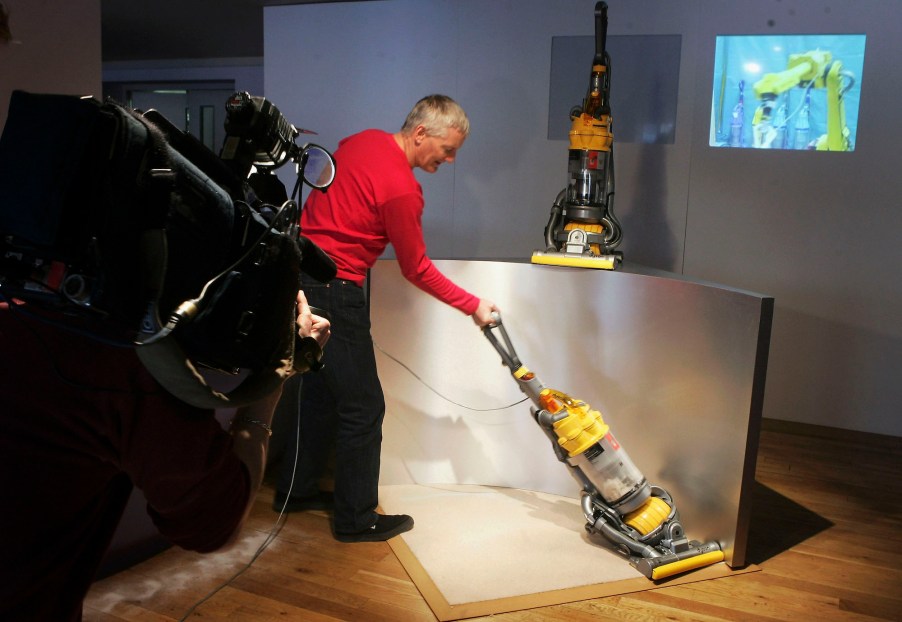
6 Things You Should Never Vacuum
Many people have been credited for the vacuum cleaner‘s invention and modification. But we know for sure that the labor-saving device helps home and automotive maintenance in a big way. But despite the convenience, you should never, ever vacuum certain things. Here are six of them.
1. Fireplace ashes

Far finer than household dust, powdery fireplace ashes have no place in your vacuum cleaner. For one thing, those ultra-small particles are too fine for a typical vac filter to trap. Plus, still-hot embers can easily hide under a blanket of ash. Suck one of them up, and you could start a fire.
Instead, wait at least 12 hours before scooping ash into a metal bucket that you store outside away from anything combustible, Chimney Solutions advises. After that, sweep out the firebox with a whisk broom or use a specially designed fireplace vacuum to remove the remaining ashes.
2. Paperclips, coins, and other small items
As tempting as it may be to roll over and suck up small things while vacuuming your carpets, it’s in the best interest of your vacuum cleaner to bend over and pick them up by hand, Good Housekeeping reports. If a loose coin, a paperclip, or an errant Lego makes its way into your vacuum cleaner, it could easily damage the motor and even tear the filter bag to shreds.
3. Broken glass
So you’ve dropped a water glass, and shards are all over your floor. Your instinct might be to grab your trusty vacuum, but that’s actually the last thing you should do. Broken glass can get lodged in the hose, and even a tiny bit of sharp glass can tear the dustbag open and cause a mess. Broken glass can also scratch canisters in bagless vacs too.
Instead, use a broom to sweep up the biggest pieces; then gently wipe the area with a wet paper towel until all remnants are gone. Alternately, you could press a soft piece of white bread onto the finest shards to take them away without potentially damaging your valuable vacuum cleaner, One Good Thing advises.
4. Broken eggs and other wet food spills
No matter how much you want it to, household vacuum cleaners aren’t designed to handle wet messes. Try to suck up a spilled bowl of cereal and milk, and you put your pricey vac in danger. Even if it doesn’t electrocute you right away, a household vac with moisture inside is apt to form hard-to-remove mold and mildew.
Instead, use a paper towel to absorb as much of the spill as you can. Then use a second paper towel to wipe the floor clean and dry. If an egg breaks on your kitchen floor, cover the mess with table salt and let it sit for a few minutes before whisking it away with paper towels, The Kitchn explains.
5. Water
It almost goes without saying that a standard electric vacuum cleaner will fail if you use it to suck up any water or liquids. Nonetheless, a lot of people wreck their vacs doing exactly that. Besides the real danger of electrocution, a vacuum that gets wet may grow so much mildew that it becomes entirely unusable.
If you have a wet/dry shop vac, use that to remove water spills. If you don’t have one, grab a roll of paper towels or use microfiber towels or re-washable kitchen rags to remove all traces of a liquid spill.
6. Long hair
Whether it comes from pets or people, long hair can wreak havoc on your vacuum cleaner. One hair or two might not cause a lot of damage, but if you use your vac to clean up after an at-home haircut, it may wrap around the floor brush and jam up the works.
So, who actually invented the vacuum cleaner?
Known best for designing suspension bridges and building Ferris wheels, English engineer Hubert Booth created a floor-cleaner in 1901, explains the UK Science Museum. Oddly, the beta design blew air out instead of in. After numerous reworkings, Booth devised a suck-it-up trolley vacuum cleaner that was bigger than a Volkswagen.
Vacuum Cleaner History concurs, adding James Spangler, Daniel Hess, James Kirby, and Anna Sutherland Bissell to its list of vac inventors. Whoever it was that came up with a workable vacuum cleaner did a great thing for everyone who likes to keep a clean house and car. Just don’t use it to vacuum up any of the aforementioned things that should never, ever be vacuumed.
Related: 4 Best Roomba Robot Vacuums Under $600 According to Consumer Reports


